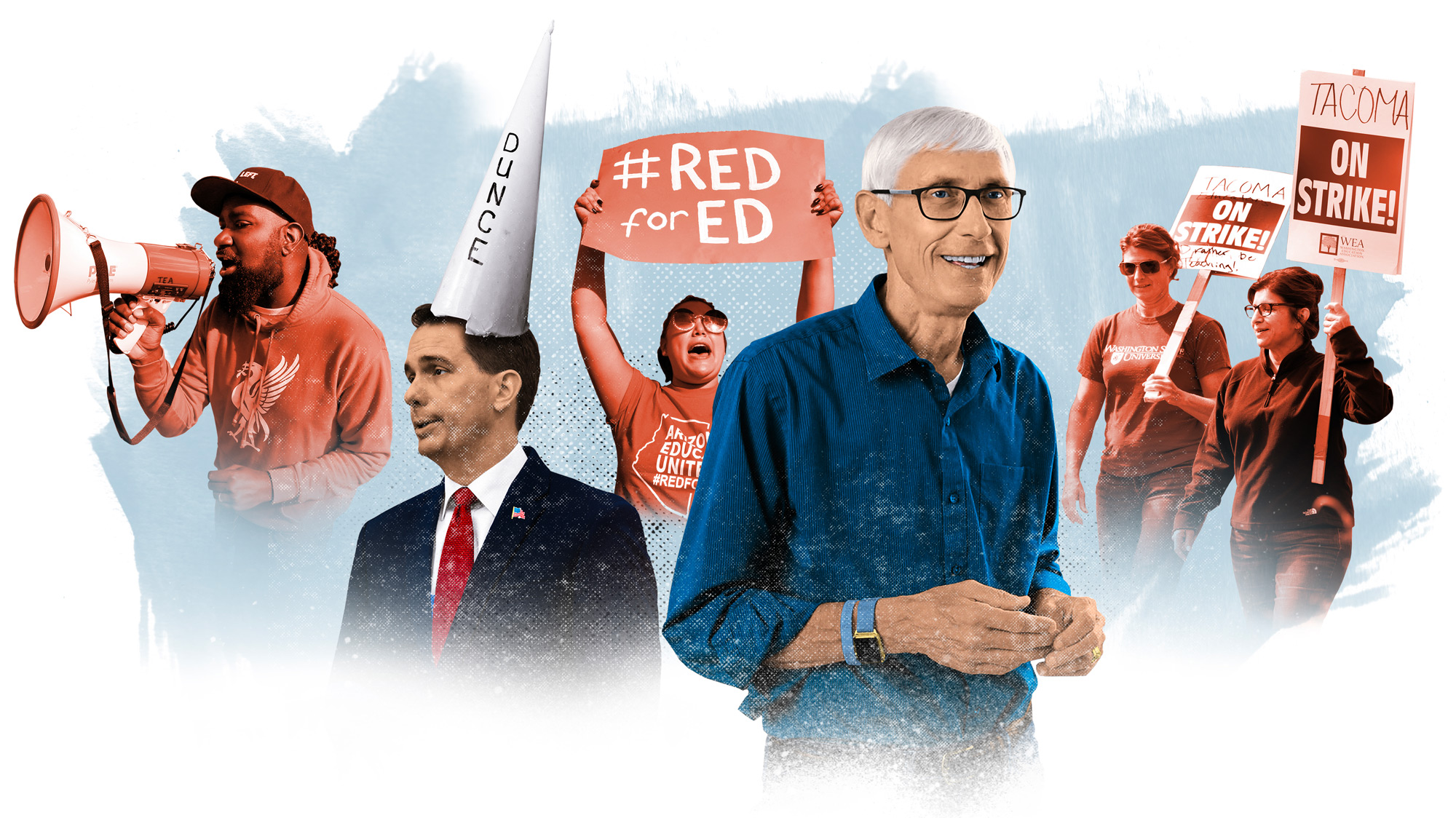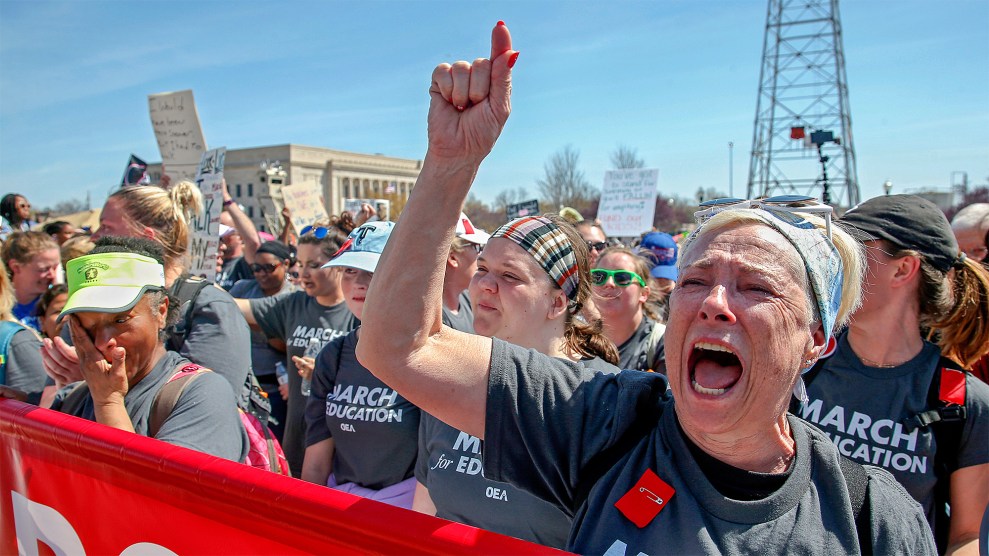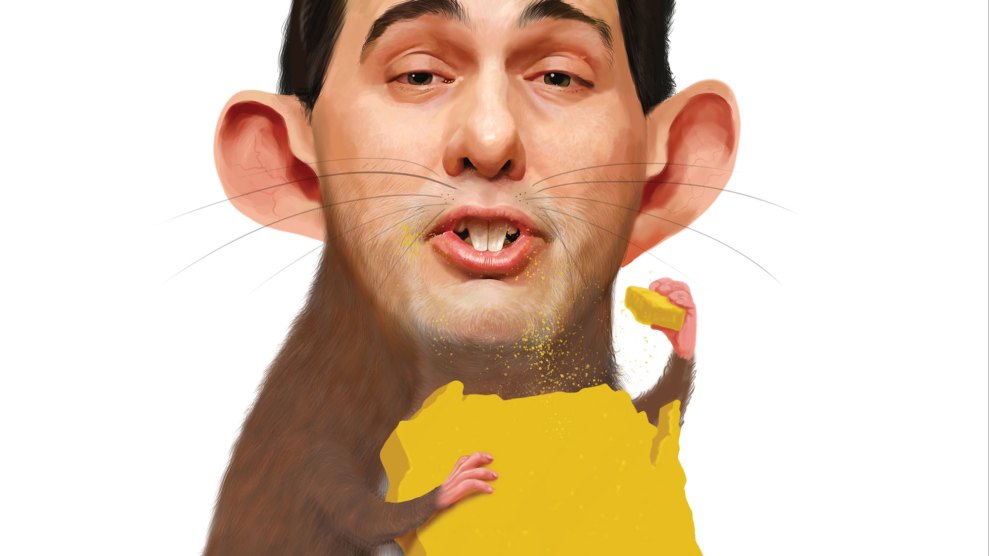Tom Rulseh was baffled by the email from an angry constituent. Why, the woman demanded to know, had the Three Lakes School District allowed Gov. Scott Walker to film a campaign ad in a public school that had nearly been forced to close thanks in part to Walker’s own budget cuts?
The ad, it turned out, featured employees and teachers from the rural Wisconsin district praising Walker’s education policies. “Governor Walker has been very helpful to us with state funding,” claimed one school board member in the ad.
“I was shocked when I saw it,” says Rulseh, the school board president. “I called a meeting right away—an open meeting the public could attend to address the matter.” In front of a standing-room-only crowd, the board passed a new policy barring its schools from being used for politicking. Walker declined to take down the ad, leaving it on the air for the rest of the week.
Walker, the union-busting Republican who came to power in the tea party wave of 2010, is running for a third term. And as the Three Lakes outcry illustrates, the race has been dominated by a debate over the state’s public schools, which have suffered from massive funding reductions and teacher shortages during his tenure.
So it’s fitting that Walker’s opponent is Tony Evers, the state’s superintendent of education. A 66-year-old with nerdy glasses that often sit slightly askew, Evers (rhymes with “fevers”) has spent his entire working life in education. He often wears a black T-shirt that says, “I ❤ My Public School,” and he has put education at the center of his campaign—a move that helped him cruise to an easy victory in a crowded primary. Now, he has a chance to do something that liberals have been dreaming about for nearly a decade: remove Walker from the Wisconsin Statehouse.
Wisconsin certainly isn’t the only place where education has become the defining issue of the midterms. Throughout 2018, the country has been gripped by a wave of teacher protests against years of crippling funding cuts and dismal compensation. A nine-day strike in West Virginia resulted in a 5 percent pay raise. The victory there inspired similar statewide strikes in Arizona and Oklahoma, the latter of which had seen roughly one-fifth of its school districts switch to a four-day week to save money. There were also walkouts in Colorado and Kentucky.
Why Teachers are Ticked Off
Wisconsin isn’t the only state where teachers are mad about budget cuts and low pay. See more charts and statistics on the sorry state of education funding across the nation.
The mass teacher mobilizations were “unprecedented” in recent decades, notes Michael Hansen, an education policy expert at the Brookings Institution. “The success of the West Virginia strike to actually get what they were asking for,” he says, “emboldened many to say, ‘Okay, we’re not going to take it anymore.’” It wasn’t just educators saying that—polling showed widespread public support for the protests.
The West Virginia strike also gave national prominence to Richard Ojeda, a Democratic state lawmaker who taught junior ROTC at a high school after serving in Iraq and Afghanistan. Ojeda, who vocally backed the teachers, is now mounting a surprisingly strong congressional bid in a district Donald Trump won by 50 points. And he isn’t alone. Like Evers, the Democrats running for governor in Minnesota and Arizona have backgrounds in education. In Connecticut, Jahana Hayes, who won the 2016 National Teacher of the Year award from President Barack Obama, is expected to be elected to Congress. According to the National Education Association, 554 educators are running for state legislative seats in November. “What is so incredible,” says the NEA’s Carrie Pugh, “is how much their experiences and their love for students motivate their story of why they are running.”
But the issue has achieved by far the most electoral significance in Wisconsin, where Walker’s attacks on education have left the school system in crisis. In 2011, Walker jammed through the anti-union Act 10, which stripped public school teachers of their right to collectively bargain, made it harder for unions to collect dues, and forced educators to contribute far more to their health insurance and pensions. The legislation sparked massive protests at the state Capitol, led to an unsuccessful recall effort, and helped turn Walker into a conservative folk hero.
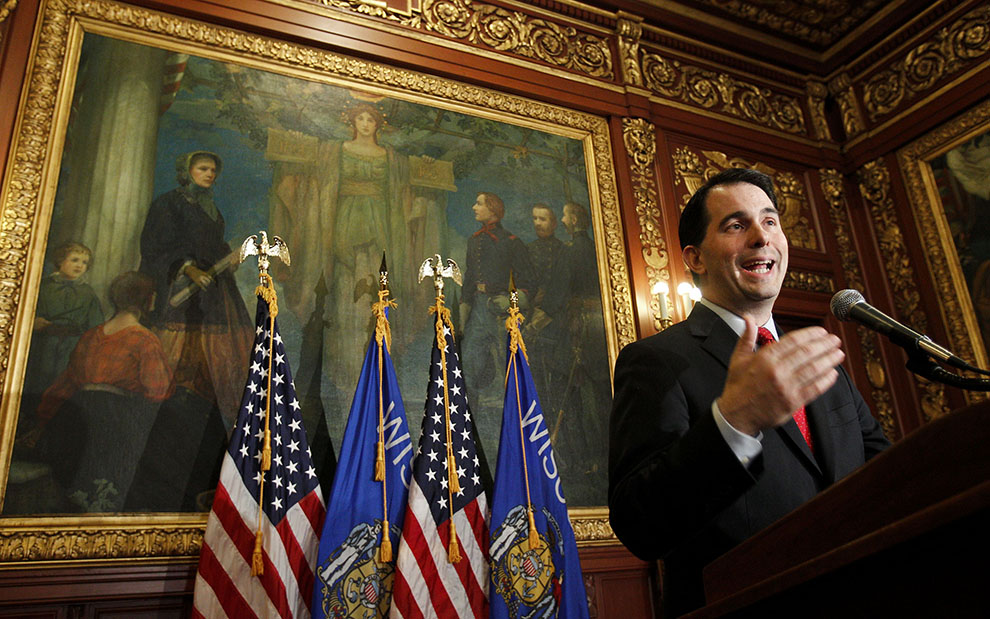
Wisconsin Gov. Scott Walker
Andy Manis/AP
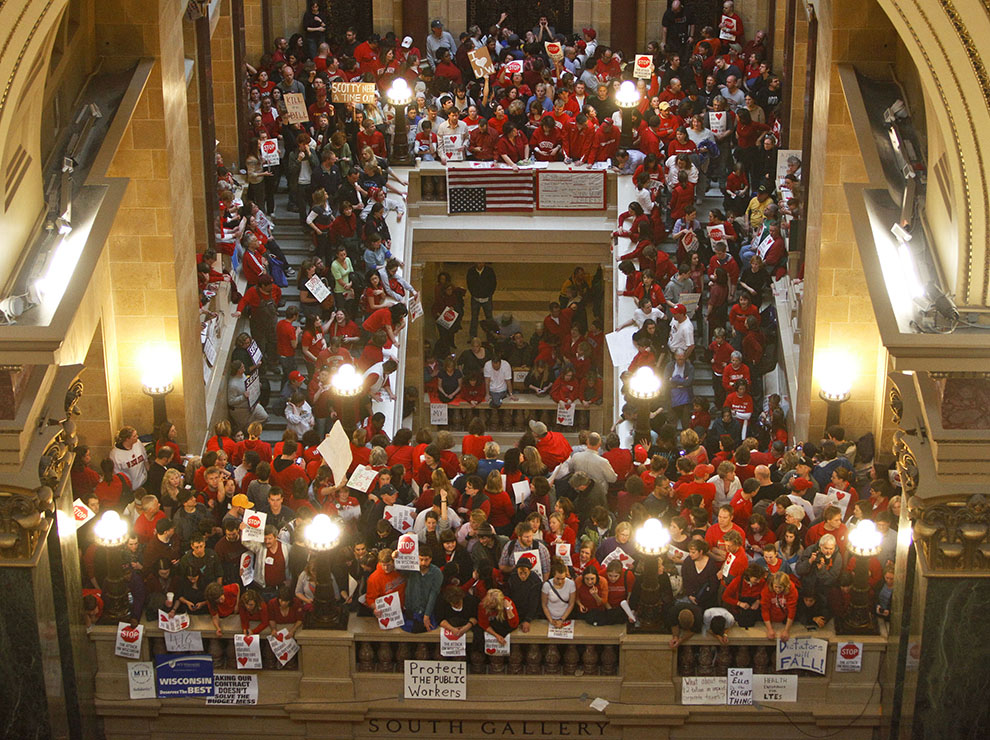
People pack the rotunda at the state Capitol in Madison, Wisconsin, in 2011 to protest Gov. Scott Walker’s effort to eliminate collective bargaining rights for many state workers.
Andy Manis/AP
At the same time, Walker slashed funding for K-12 schools by $792 million over two years. During his first five years in office, he cut education spending by a total of $1.2 billion. More recently, he’s increased funding somewhat, though not enough to offset the damage caused by the earlier reductions.
The result has been disastrous. Districts around the state face applicant shortages when trying to fill job openings, as teachers look for work in other states and new college graduates avoid the profession altogether. Between the 2011-12 and 2015-16 school years, median compensation for Wisconsin’s public school teachers fell 12.6 percent, a reduction in wages and benefits of nearly $11,000 annually, according to a study by the left-leaning Center for American Progress. “We’ve been nonstop battling the effects of [Act 10],” says Amy Mizialko, the president of the Milwaukee teachers’ union. “Our students have suffered greatly as a result.”
Cash-strapped school districts have been forced to ask voters to approve local property tax hikes. In 2017, Three Lakes voters chose to raise property taxes by more than $15 million over five years, a huge sum in a rural community where the vote total was 750 people in favor and 294 opposed. Local administrators had warned that the district’s two schools—the K-12 school in Three Lakes and a K-6 in nearby Rhinelander, with a combined student population of 512—would shutter if the vote failed. Other districts have turned to similar measures. In April, 55 of 66 local school-funding proposals passed.
In August, a poll from Marquette University found that 61 percent of Wisconsin voters said they wanted an increase in school spending; just 32 percent said they would prefer a property tax cut. In the same poll, 40 percent of voters said education was the most or second most important issue in November (just behind jobs, at 41 percent). Forty-four percent said schools are in worse shape today than they were a few years ago, with just 15 percent saying things are better.
It all adds up to the most serious challenge Walker has faced in what, until recently, had been a charmed political career. He handily won the governorship in 2010 and then easily beat back the union-led recall effort in 2012. By 2014, when he secured his second term, Walker had become an icon on the right. In 2015, he briefly tried his hand at presidential politics—a bid that lasted just two months, despite a super-PAC that raised $24 million to boost his campaign. After that, his approval numbers back home cratered. In July, one survey ranked him as the ninth most unpopular governor in the country. And while Trump narrowly won the state two years ago, recent polls have shown Evers with a small lead. In the August primary, 82,000 more Democrats voted than Republicans. Earlier this year, Democrats won two special elections for the state Senate in traditionally Republican areas.
A lot has changed in Wisconsin since Walker last faced voters. Beyond his bumbling White House run, he cut a $4 billion deal with Foxconn, the Taiwanese tech manufacturer, to build a plant in southeastern Wisconsin. Walker has boasted that the project will create 13,000 jobs, though the number could be as low as 3,000. Either way, it’s widely seen as a poor return on investment, and it hasn’t proved particularly popular—Walker even had to run campaign ads defending the arrangement.
Evers has hammered these issues. “To beat Scott Walker, we need a stronger vision for our future,” he says in his first TV ad. “Instead of investing…in handouts to companies like Foxconn, I’m gonna invest in our kids and our workers…I’m going to make sure that every kid gets a great school, no matter what the zip code.”
Evers grew up in Plymouth—a small town near Sheboygan that, he notes without irony, is the “cheese capital of the world.” His father ran a tuberculosis sanitarium, and his mother was a nurse. He credits them with infusing him with a spirit of social justice, which is why he went into education. He worked his way through undergrad, a master’s program, and a doctorate in educational administration, all at the University of Wisconsin-Madison, and spent four years teaching before accepting a job as an elementary school principal in the town of Tomah. A decade ago, he survived esophageal cancer after having his esophagus and part of his stomach removed—an experience he often mentions when discussing health care policy.
He first won political office in 2009, when he was elected to serve as the state’s nonpartisan education superintendent; he’s now in his third term. It’s a position without much inherent power. The superintendent can propose an education budget, but the governor decides what to send to the state Legislature; for years, Walker requested far less funding than Evers recommended. “People see him as the person that’s been trying to thwart the damage that Scott Walker has wrought on the state in his public education policy,” says Mizialko. Evers also has authority over teacher licensing, a power he’s used to relax credentialing requirements to combat the state’s staffing shortage.
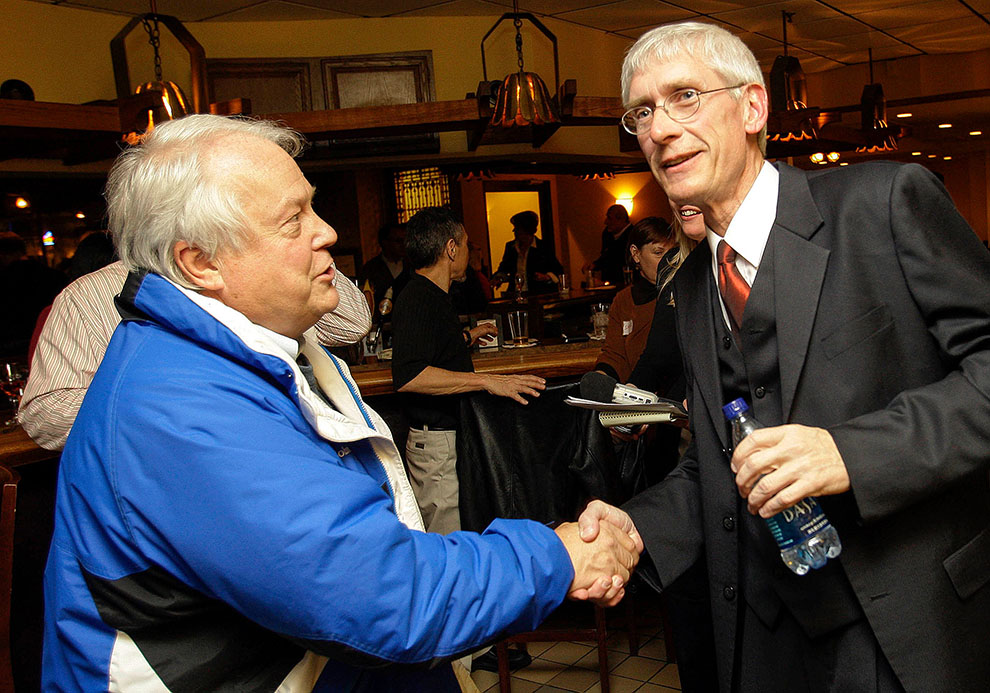
Tony Evers (right), Wisconsin’s state superintendent of education, is running against Gov. Scott Walker.
Mark Hoffman/Journal Sentinel/AP
A walking Midwestern stereotype, Evers married his high school sweetheart in 1972—the pair met in kindergarten—and their hobbies include bike rides and polka dancing. On primary night earlier this year, he passed the time waiting for returns by playing euchre with his kids and grandkids.
When I spoke with him a week later, his campaign was gearing up. During the primary, he had only three full-time staffers on payroll, and it still felt more like a bid for the state Legislature than a robust organization built for one of the country’s most competitive governor’s races.
As I sat in the bare-bones entryway in his Madison campaign office, I could hear Evers thanking a donor for agreeing to contribute $5,000. Then I was ushered into a windowless room where I spoke with the candidate alone—no press aide monitoring our interview, an unusual circumstance for a high-profile campaign. Over nearly an hour, he referred to Trump as “the nutcase” as he criticized Walker for not speaking out against the president, and said, “No shit, no I don’t,” when I asked whether he thought Walker took racial divides in the state seriously. “Race is an issue in Wisconsin, and the governor has to be part of that conversation,” he said.
Evers is a lifelong liberal, but until recently, he’d never been all that active in the Democratic Party. When I asked about his earlier involvement in politics, he reached back to an election night party he hosted in 1980, lamenting that in those days the networks called the election before all the votes were cast, so his guests arrived to find a depressing wake for Jimmy Carter’s presidency. He voted for Hillary Clinton over Bernie Sanders, but he seems entirely uninterested in the soul-wrenching national debate over what, and who, the party should represent. He’d much rather talk about funding for local roads—Wisconsin ranks 44th nationally in road quality, according to US News & World Report, and angry residents have tried to rebrand the state’s infamous potholes as “Scott-holes.”
In the tradition of a state that produced some of the country’s most visible left-of-center leaders, Evers does have a clear progressive streak. He’s for a $15-per-hour minimum wage, wants Wisconsin to spend more on drug rehabilitation and less on incarceration, and would accept Obamacare funding to expand Medicaid—money that Walker and GOP state lawmakers have rejected. But he says he’s committed to working with the Republicans who are likely to keep control of at least part of the Legislature. He cites Bill Clinton’s presidency as a model for dealmaking. “I’ve always been a relative pragmatist, and social justice is important to me,” he says. “But I’m also one that believes we have to accomplish something.”
That’s carried through to the positions he’s staked out on the campaign trail. He supports medical marijuana but doesn’t think the state government should legalize recreational weed, preferring to leave that question up to voters. He won’t try to unilaterally revoke the Foxconn giveaways, as some Democrats have called for, but he plans to pressure the company to adopt better environmental practices and to help build public transportation for its new workforce. “We’re building their roads. We can slow down building their roads. I think they have as much [of a stake] as I [do] in making sure that we see eye to eye,” Evers says. “Anybody in the state of Wisconsin could have cut a better deal than Scott Walker did.”
Evers is even seeking a middle ground on the most controversial elements of Walker’s legacy. While he joined the Act 10 protests at the state Capitol in 2011 and blames the law for many of Wisconsin’s education problems, he notes that GOP lawmakers are unlikely to repeal the measure wholesale. Instead, he says he’d try to peel off some Republicans to overturn pieces of it, including the provision that forces teachers to hold a new union vote every year.
He hopes this approach can help heal the wounds left by the bitter debate over the law. “I believe the state hasn’t recovered, and not just the people that were protesting. The people that didn’t want teachers protesting haven’t gotten over that either,” he says. “It’s time to get to a different place.” School funding, he believes, is a more productive issue—even many Walker supporters have voted to raise their own taxes to make up for the state-imposed shortfalls in recent years. “They need more resources, and we need to stop fighting about that,” Evers says.
Walker seems to be slowly getting the message, too. Last year, for the first time, he adopted nearly all of Evers’ proposed budget—a clear sign the governor now understands the threat the funding issue poses to his political future. The result was a $639 million increase in education spending for the 2017-19 budget. Walker has taken to reminding voters that Evers called the move “pro-kid.”
It wasn’t enough for Evers. In September, he upped the ante once again; in his role as superintendent, he requested a $1.4 billion education spending hike for the 2019-21 budget—an increase of 10 percent. “We’re not to the point where we should be, so we continue to fall backward,” Evers says. “We can’t afford to do that anymore.”
He isn’t naive about the challenge he’s facing. Walker’s assault on organized labor has hamstrung local unions, which were once a powerful force backing progressive candidates. The state’s main teachers’ union had 98,000 members prior to Act 10; today it has just 32,000. Wisconsin’s voter ID law, backed by Walker, has also paid dividends for Republicans, likely helping Trump secure a 23,000-vote victory in 2016.
Still, Evers thinks education will be the issue that convinces some of those Trump voters to abandon Walker. “I believe there are folks that supported Donald Trump for some very legitimate reasons,” he says. “But they are also people that believe the public schools should be stronger.”
Image credits: Photo illustration: Gluekit; Source photos: Andy manis/Getty, Michael Westoff/iStock, Tony for Wisconsin, Ted S. Warren/AP, Norma Jean Gargasz/Alamy, Chona Kasinger/Bloomberg/Getty
